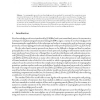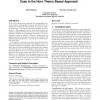IANDC
2008
13 years 9 months ago
2008
Recently automated deduction tools have proved to be very effective for detecting attacks on cryptographic protocols. These analysis can be improved, for finding more subtle weakn...
CORR
2010
Springer
13 years 9 months ago
2010
Springer
Much of the literature on rational cryptography focuses on analyzing the strategic properties of cryptographic protocols. However, due to the presence of computationallybounded pl...
ASIAN
2009
Springer
13 years 10 months ago
2009
Springer
In cryptographic protocols, zero knowledge proofs are employed for a principal A to communicate some non-trivial information t to B while at the same time ensuring that B cannot de...
IWFM
2003
13 years 10 months ago
2003
Meadows recently proposed a formal cost-based framework for analysis of denial of service. It was showed how some principles that have already been used to make cryptographic prot...
ICALP
2007
Springer
13 years 11 months ago
2007
Springer
Adaptive security, while more realistic as an adversarial model, is typically much harder to achieve compared to static security in cryptographic protocol design. Universal composi...
CCS
2008
ACM
13 years 11 months ago
2008
ACM
We intend to narrow the gap between concrete implementations of cryptographic protocols and their verified models. We develop and verify a small functional implementation of the T...
CCS
2008
ACM
13 years 11 months ago
2008
ACM
In the Horn theory based approach for cryptographic protocol analysis, cryptographic protocols and (Dolev-Yao) intruders are modeled by Horn theories and security analysis boils d...
CCS
2008
ACM
13 years 11 months ago
2008
ACM
As cryptographic protocols execute they accumulate information such as values and keys, and evidence of properties about this information. As execution proceeds, new information b...
ASM
2008
ASM
13 years 11 months ago
2008
ASM
We address the proof-based development of cryptographic protocols satisfying security properties. Communication channels are supposed to be unsafe. Analysing cryptographic protocol...
ESOP
2009
Springer
14 years 1 months ago
2009
Springer
Gordon and Jeffrey have proposed a type and effect system for checking authenticity in cryptographic protocols. The type system reduces the protocol verification problem to the typ...



